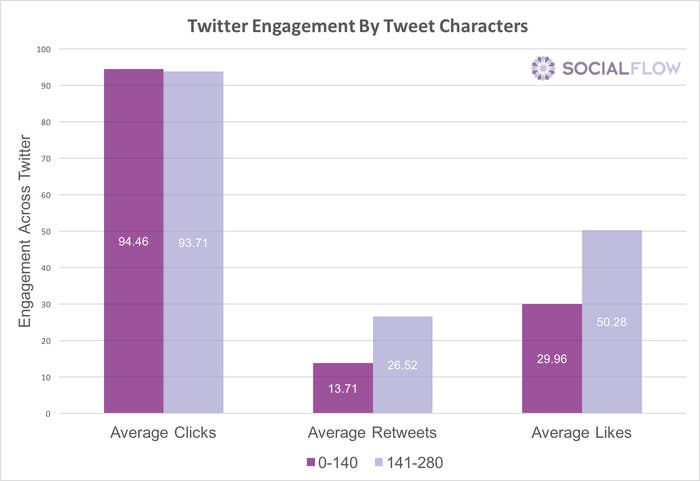
Given the deluge of complaints about Twitter's 280-character limit when it debuted this fall, you'd think people would be ignoring the new, lengthier tweets.
But that doesn't appear to be the case.
Early data shows tweets above 140 characters are being liked and retweeted at a rate approximately double that of their shorter counterparts. BuzzFeed News obtained the data from SocialFlow, a publishing tool used by approximately 300 major publishers including the New York Times and the Wall Street Journal.
SocialFlow reviewed tens of thousands of tweets published between Wednesday Nov. 29 and Wednesday Dec. 6, analyzing clicks, retweets, and likes. It determined that tweets above 140 characters are being retweeted 26.52 times on average compared with 13.71 times for tweets of 140 characters and below. The company also found that longer tweets are being liked — again on average — 50.28 times compared with 29.96 times for shorter tweets. Clicks per tweet for the time period analyzed were about even.
A Twitter spokesperson pointed BuzzFeed News to a company blog post published when the 280-character limit rolled out universally. "In addition to more Tweeting, people who had more room to Tweet received more engagement (Likes, Retweets, @mentions), got more followers, and spent more time on Twitter," the post said.
SocialFlow's data quantifies for the first time an increase in user engagement around tweets using Twitter's new character limit. It's a significant bump and one that would seem to put to rest the theory that longer tweets might tax the attention spans of people used to reading those composed of no more than 140 characters. But again, the data is publisher-specific.
A word of caution: Optimizing for engagement is not always good. Facebook found this out the hard way after its engagement-driven algorithm pushed fake news and polarizing content into its News Feeds ahead of the 2016 US presidential election.
Still, for the moment at least, it appears Twitter did something that worked.
